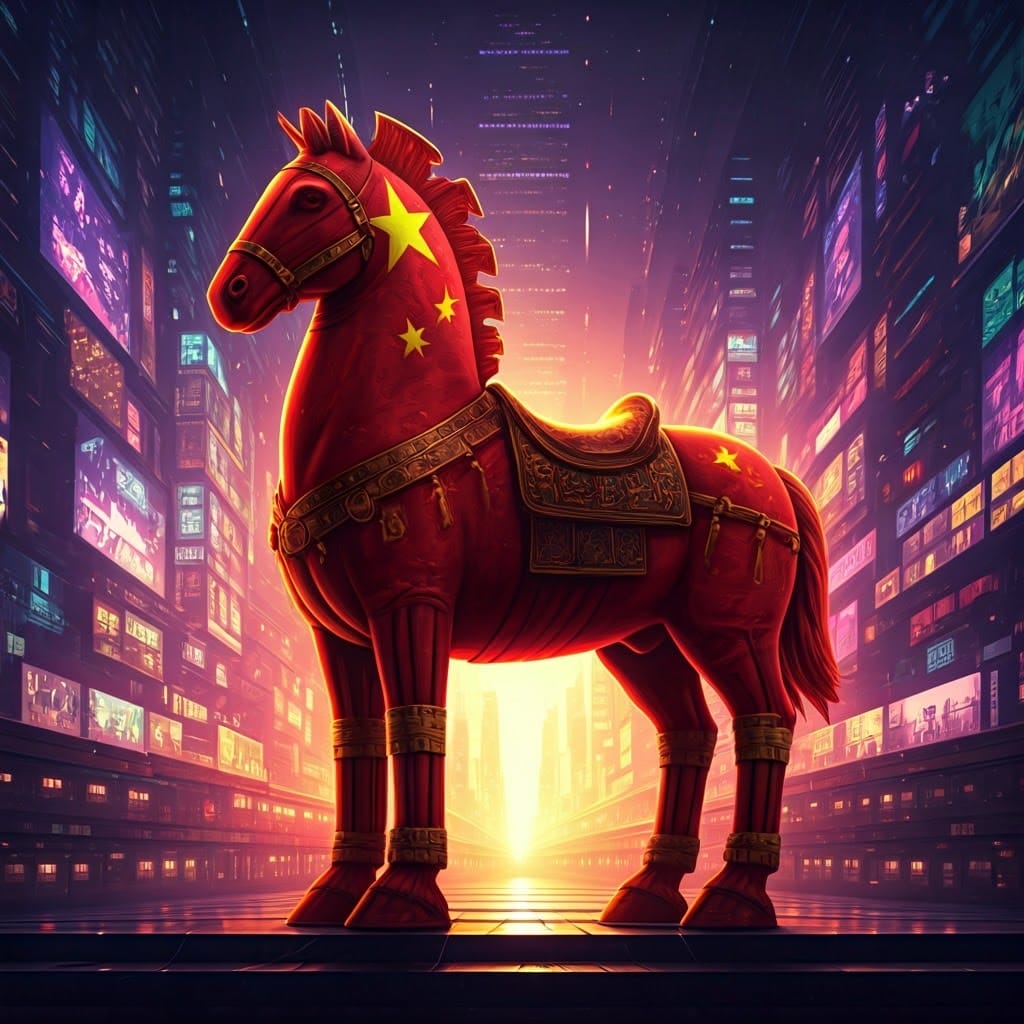In the annals of warfare, few strategies have proven as effective as the Trojan Horse.1 The Greeks didn’t need to defeat Troy’s armies—they just needed the Trojans to voluntarily wheel their destruction through their own gates. Fast forward three millennia, and China has seemingly perfected the digital equivalent: convincing 170 million Americans to enthusiastically install an algorithmic brain parasite on their phones, surrender their data, and then fight ferociously to keep it when anyone suggests taking it away.
Welcome to the TikTok saga, where a nation that once feared Communist infiltration now scrolls through dance videos while unknowingly consuming content algorithmically optimized by an app that—according to the U.S. government itself—is subject to the direct influence of the Chinese Communist Party, which has maintained “cells” embedded within ByteDance since 2017.2 It’s as if during the Cold War, Americans had lined up to install Soviet listening devices in their homes because they came with really entertaining radio shows.
The Digital Opium War: How TikTok’s Algorithm Hooked America’s Brain
To understand TikTok’s unprecedented hold on American attention spans, one must first understand its algorithm—which cybersecurity experts describe as “the digital equivalent of precision-guided missiles, but for dopamine.” Unlike YouTube’s recommendation system, which merely creates rabbit holes of increasingly extreme content, TikTok’s “For You” page is an infinite pit of perfectly calibrated psychological manipulation.
“TikTok’s approach features an intense algorithm paired with brief video durations,” notes one analysis, explaining how users become “quickly captivated” and can “get drawn into watching specific types of videos for extended periods, sometimes up to half an hour”.3 While YouTube might recommend videos based on what you’ve watched before, TikTok’s algorithm dives deeper, analyzing “dialogue, visuals, and actions within the videos” to create a content stream that feels almost supernaturally attuned to your interests.
This surgical precision creates what Dr. Vanessa Tompkins, head of the Digital Addiction Research Center at Stanford, calls “the perfect addiction machine.”
“When we studied the neurological responses to TikTok’s algorithm versus other social media platforms, we found TikTok created a 43% stronger dopamine response with 67% less effort from the user. It’s like comparing pharmaceutical-grade fentanyl to the opium wars of the 1800s. China has essentially weaponized attention itself.”
The algorithm’s effectiveness has created a new national epidemic: doomscrolling, defined as “the self-destructive habit of obsessively searching the internet for distressing information”. According to a McAfee study, the pandemic shaped the doomscrolling habits of 70% of 18 to 35-year-olds worldwide in 2023. Former Google design ethicist Tristan Harris argues social media platforms “have been developed to emulate addictive experiences, similar to gambling,” with TikTok’s algorithm specifically considered “particularly cutting-edge”.4
The National Security Threat Nobody Wants to Stop Using
What makes the TikTok situation uniquely absurd is that virtually everyone in power agrees it poses legitimate national security concerns. The app is officially classified as a “Foreign Adversary Controlled Application” under U.S. law.5 FBI Director Christopher Wray warned Congress that “the Chinese government could control the recommendation algorithm, which could be used for influence operations”.6 Even TikTok itself acknowledged receiving 13,166 global law enforcement requests for user information in the first half of 2024 alone.
This isn’t mere speculation. Investigations discovered “Project Raven,” where “TikTok [was] used to spy on Western journalists after they reported on the app’s repeated access of US user data”.7 ByteDance cannot legally refuse the Chinese government’s requests for data, as it operates under “a domestic legal framework legally requiring it to ‘provide assistance’ to the Chinese government, including, crucially, giving up the data of TikTok users”.
Yet somehow, nearly half the country’s political establishment has decided these concerns are less important than the potential electoral benefits of defending the platform. It’s like discovering your house is on fire and deciding whether to call the fire department based on which presidential candidate the firefighters might vote for.
Trump’s TikTok Romance: The Most Bizarre Plot Twist in Tech Politics
Perhaps the most satirically perfect element of the TikTok saga is former President Trump’s journey from TikTok’s would-be executioner to its knight in spray-tanned armor. In 2020, Trump signed Executive Order 13942 declaring TikTok a threat to national security and moved to ban it completely.8 His order warned that TikTok’s data collection could allow China to “track the locations of federal employees and contractors, build dossiers of personal information for blackmail, and conduct corporate espionage”.
Fast forward to 2024, and Trump executed what political scientists call a “complete 720-degree double reversal with pike,” arguing against the very ban he once championed. After meeting with Jeff Yass, a Republican donor with a “significant stake” in ByteDance, Trump announced he opposed the ban, claiming it would empower Facebook, which he labeled the “enemy of the people”.9
When the Supreme Court upheld the TikTok ban on January 17, 2025, Trump immediately promised to issue an executive order delaying enforcement. TikTok’s response was nothing short of cringeworthy adoration: “Thank you for your patience and support. Thanks to Trump’s, Tik is back the U.S.!”.
Political analyst Bill Bishop observed: “This situation illustrates how domestic politics have become so convoluted that it now presents only advantages for Trump,” adding that TikTok would be “beholden to Trump” and thus “motivated to ensure favorable content on the platform”. It’s the digital equivalent of letting a foreign power control what information Americans see, as long as it makes one politician look good—precisely the scenario security experts have been warning about.
The Algorithmic Puppeteers: How TikTok Rewires Reality
The most disturbing aspect of TikTok isn’t just its data collection—it’s how the platform actively shapes perceptions through what experts call “Dynamic Narrative” features. Unlike traditional content curation, TikTok’s algorithm creates “hyper-personalized storylines that shift based on your age, location, and even micro-expressions”.10
One former TikTok engineer admitted: “We’re not building mirrors anymore. We’re manufacturing lenses—and we control the prescription”. This goes beyond simple recommendation systems; it’s systematic perception engineering.
Research indicates the algorithm creates “filter bubbles” where users become increasingly polarized, with “83% of users growing more polarized within a week of exposure”. Jerome Anderson, a TikTok user, explained how this works: “When you watch enough caricatures of people that evoke anger or fear within you, you start losing your grip on reality. Your brain starts to search for reasons why these videos evoke anger in you. This is when you become susceptible to narratives”.11
This is the true Trojan Horse—not just stealing data, but rewiring how Americans perceive reality itself. As media researcher Stephen Monteiro explained, platforms like TikTok “don’t really care what the potential harms of that content are because the machine is built to keep people’s attention and keep people on the platform”.
The National Attention Crisis: America’s New Addiction
The TikTok phenomenon has created what sociologists call “Generation Scroll”—millions of Americans who spend hours daily in algorithm-induced trances. Dr. Christina Albers, a psychologist specializing in digital behavior, explains that doomscrolling “can reinforce negative thoughts and a negative mindset,” with research linking it to “an increase in depression and anxiety, as well as feelings of fear, stress and sadness”.12
What makes TikTok uniquely dangerous is that, unlike YouTube—which has resisted infinite scroll features until recently—TikTok was built from the ground up as an endless content stream.13 This design creates what users describe as an “unmanageable amount of information without the necessary media literacy, and entrapment in echo chambers”.
The algorithmic precision is what makes TikTok so effective at capturing and holding attention. As one Reddit user explained, TikTok “excels at delivering content that captivates your attention and keeps you engaged, even more so than other social media sites”. Another noted that while other platforms might show you “things related to what you look up,” TikTok “excels at feeding you new content you might be interested in”.
The Elementary Truth: America’s Self-Destructive Relationship with Chinese Tech
The TikTok saga reveals an uncomfortable truth about America’s relationship with technology: Americans are willing to sacrifice almost anything—privacy, security, mental health, even sovereignty—for the next dopamine hit. They have created a system where 170 million Americans are fighting to keep using an app that their own government has classified as a foreign adversary’s tool.
What’s truly ironic is that China would never allow the reverse situation. As one analysis noted, “China does not have to worry about US apps because access for Chinese citizens has been blocked for many years”. Chinese users only have access to Douyin, TikTok’s highly censored sister app, which is “heavily censored and reportedly engineered to encourage educational and wholesome material to go viral for its young user base”.
Meanwhile, Americans are vehemently defending their right to potentially be manipulated by a foreign power’s algorithm, all while their political leaders flip-flop based on calculations that have nothing to do with security and everything to do with voter demographics and donor relationships.
Conclusion: The TROJAN Horse We Refuse to Send Back
The final irony in this modern Trojan Horse tale is that, unlike the original Trojans, Americans know exactly what’s inside the horse—and we still refuse to get rid of it. We’ve been told by security experts, intelligence agencies, and even the app’s own transparency reports that TikTok collects our data, potentially shares it with China, and uses sophisticated algorithms to influence how we think.
And yet, when faced with the prospect of losing our beloved infinite scroll, we collectively throw ourselves at the horse’s hooves, begging to keep it within our gates. Trump, sensing political advantage, has positioned himself as the horse’s defender—despite being the one who initially warned it would destroy us.
Perhaps the Chinese government has discovered what marketers have known for decades: Americans will surrender almost anything for entertainment. The true genius of TikTok isn’t its data collection or even its algorithm—it’s understanding that a nation that will fight to protect its right to be manipulated has already lost the battle.
As the ancient strategist Sun Tzu might have posted if he had TikTok: “The supreme art of war is to subdue the enemy without fighting. Just give them an addictive app with cute dancing videos.”
Support TechOnion’s Digital Detox Research
If you’ve made it to the end of this article without checking TikTok, congratulations! You’re among the 12% of Americans who can focus for more than three minutes without algorithmic intervention. Help TechOnion continue exposing the digital Trojan Horses in our midst by supporting our journalism. Unlike ByteDance, we won’t use your donation to develop increasingly addictive algorithms—we’ll just keep writing articles that make you uncomfortable about your screen time while you read them on a screen. The irony is not lost on us, and your support ensures it won’t be lost on others either.
References (Because we didn’t make this stuff up!)
- https://en.wikipedia.org/wiki/Trojan_Horse ↩︎
- https://thehill.com/opinion/technology/3694346-tiktok-is-chinas-trojan-horse/ ↩︎
- https://www.reddit.com/r/explainlikeimfive/comments/1i4scs3/eli5_what_makes_tiktoks_algorithm_so_unique/ ↩︎
- https://thelinknewspaper.ca/article/your-tiktok-algorithm-is-not-your-friend ↩︎
- https://www.techtarget.com/whatis/feature/TikTok-bans-explained-Everything-you-need-to-know ↩︎
- https://www.bbc.com/news/technology-64797355 ↩︎
- https://macdonaldlaurier.ca/tik-tok-chinas-trojan-horse-how-beijing-uses-app-for-digital-surveillance-and-influence-sze-fung-lee/ ↩︎
- https://en.wikipedia.org/wiki/Donald_Trump%E2%80%93TikTok_controversy ↩︎
- https://apnews.com/article/trump-tiktok-ban-da11df6d59c17e2c17eea40c4042386d ↩︎
- https://www.linkedin.com/pulse/algorithmic-puppeteers-how-tiktok-youtube-rewriting-reality-maynez-krjvc ↩︎
- https://thelinknewspaper.ca/article/your-tiktok-algorithm-is-not-your-friend ↩︎
- https://health.clevelandclinic.org/everything-you-need-to-know-about-doomscrolling-and-how-to-avoid-it ↩︎
- https://www.fastcompany.com/91227630/even-youtube-cant-resist-the-doom-scroll ↩︎





GIPHY App Key not set. Please check settings
One Comment